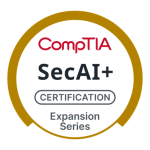Get an exclusive first look at CompTIA’s vision for 2026 in this dynamic session. The spotlight will be on the exciting new product lines, timely refreshes, and learning platform enhancements scheduled for next year. Hear directly from CompTIA’s leadership team about the next wave of solutions designed to empower educators, businesses, and learners for the opportunities of tomorrow.
This webinar will cover:
- Highlights from 2025, including a series of short Essentials courses focused on competency
- New expansion certifications - CompTIA’s approach to enabling workers with critical skills in AI and automation
- A deep dive into significant learning platform enhancements, such as AI-enabled scenario activities, alternative labs for accessibility, and progress dashboards
- Major new releases, refreshes, and retirements planned for 2026
- A first look at CompTIA SecOT+, the highly anticipated new certification that bridges knowledge gaps between Information Technology and Operational Technology as businesses transform for the digital age
Why Attend:
This session is your front-row seat to what’s next from CompTIA, helping you plan proactively and position your organization to maximize value as soon as these solutions are ready to launch.
What: CompTIA webinar on 2026 Product Roadmap & Innovations
When: Wednesday, November 12, 2025, 10:00 AM CST
Who: Katie Hoenicke, SVP Product Development, Zach Steele, Sr Director Learning Platforms, Henry Mann, Sr Director Product Development
Where: ON24
Register Here





